Public Enemies
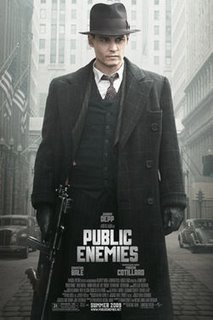 Michael Mann's Public Enemies sometimes seems more interested in the period the story is set in, rather than the people inhabiting it. Great care was taken in recreating the clothing, cars, and look of the 1930s. The characters, on the other hand, don't stand out that much. Much of this was intentional, as the movie seems to take a very low key approach. Anyone expecting the grand epic feel of Brian De Palma's The Untouchables will be disappointed.
Michael Mann's Public Enemies sometimes seems more interested in the period the story is set in, rather than the people inhabiting it. Great care was taken in recreating the clothing, cars, and look of the 1930s. The characters, on the other hand, don't stand out that much. Much of this was intentional, as the movie seems to take a very low key approach. Anyone expecting the grand epic feel of Brian De Palma's The Untouchables will be disappointed.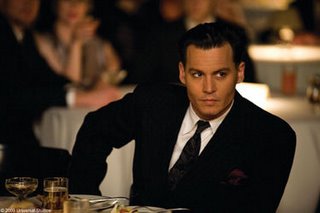 Does this make it a bad movie? Not really. I was engaged for the most part, while some scenes seemed to keep me at a total distance. The movie makes a surprising and perhaps risky decision of not really telling us anything about its main character, John Dillinger (played here by Johnny Depp). We don't get his history, we don't get to see how he began his career as a gangster, and we don't get to see how he captured the imagination of the people. He captured their imagination so much so that when he is captured by the police at one point and is brought before the press, the reporters treat him as if he's a movie star instead of a criminal. The movie opens in 1933, when Dillinger was already well into his career, and follows up to that fateful night on July 21st, 1934, when he was shot and killed outside of Biograph Theater. During that time, we see him rob banks across the Midwest, sees those who were once his friends and allies turn against him, and try to hold onto the one woman who means anything to him - Billie Frechette (Marion Cotillard), who is drawn into Dillinger. He genuinely cares about her, and their relationship is the one main human element that holds the movie together.
Does this make it a bad movie? Not really. I was engaged for the most part, while some scenes seemed to keep me at a total distance. The movie makes a surprising and perhaps risky decision of not really telling us anything about its main character, John Dillinger (played here by Johnny Depp). We don't get his history, we don't get to see how he began his career as a gangster, and we don't get to see how he captured the imagination of the people. He captured their imagination so much so that when he is captured by the police at one point and is brought before the press, the reporters treat him as if he's a movie star instead of a criminal. The movie opens in 1933, when Dillinger was already well into his career, and follows up to that fateful night on July 21st, 1934, when he was shot and killed outside of Biograph Theater. During that time, we see him rob banks across the Midwest, sees those who were once his friends and allies turn against him, and try to hold onto the one woman who means anything to him - Billie Frechette (Marion Cotillard), who is drawn into Dillinger. He genuinely cares about her, and their relationship is the one main human element that holds the movie together. What works best in Public Enemies is Dillinger himself, or rather Depp's portrayal of him. He is not made out grandiose, likable, or a legend. He can be smooth and charming, or he can be prone to violence at a moment's notice. The movie and the performance gets to show every side of him, without going too deep into him. This is not a biography film about Dillinger, this is a dramatization of the last year of his life. This approach both intrigued and frustrated me. It intrigued me, because Depp lets us close enough into his character, while still lending his portrayal plenty of mystery. Depp and director Mann see their subject as a smart but simple man. He likes the simple things in life like fast cars, women, and movies. He also has a genuine passion for what he does, as just hearing about the potential haul of a bank heist is enough to make him raise his eyebrows with interest. But, he's also a careful man. He doesn't want anyone to get hurt during his jobs, and to ensure that neither he or his men are put in harms way, he takes hostages, who he then drops safely off when they're away from the police. We can understand why Dillinger becomes frustrated when he's forced to work alongside Baby Face Nelson (Stephen Graham) late in the film. Nelson is reckless and violent, and Dillinger does not feel safe following his methods.
What works best in Public Enemies is Dillinger himself, or rather Depp's portrayal of him. He is not made out grandiose, likable, or a legend. He can be smooth and charming, or he can be prone to violence at a moment's notice. The movie and the performance gets to show every side of him, without going too deep into him. This is not a biography film about Dillinger, this is a dramatization of the last year of his life. This approach both intrigued and frustrated me. It intrigued me, because Depp lets us close enough into his character, while still lending his portrayal plenty of mystery. Depp and director Mann see their subject as a smart but simple man. He likes the simple things in life like fast cars, women, and movies. He also has a genuine passion for what he does, as just hearing about the potential haul of a bank heist is enough to make him raise his eyebrows with interest. But, he's also a careful man. He doesn't want anyone to get hurt during his jobs, and to ensure that neither he or his men are put in harms way, he takes hostages, who he then drops safely off when they're away from the police. We can understand why Dillinger becomes frustrated when he's forced to work alongside Baby Face Nelson (Stephen Graham) late in the film. Nelson is reckless and violent, and Dillinger does not feel safe following his methods.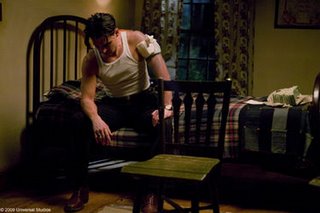 The part that frustrated me about the portrayal is that sometimes I felt like there needed to be more information, almost as if the movie was speaking directly to people who knew exactly what it was talking about, so it didn't feel as if it needed to give any more information. In the film's opening scene, Dillinger stages a prison break out for some of his friends, and loses one of them in the escape. The movie makes it clear to us that this person was important to him, but never really tells us why. It's a problem that carries throughout the film. Aside from his relationship with Billie, we never get a true sense of his feelings or relationships to many of the people he works with. This lessens the impact of what should be a great scene late in the film. It certainly starts out great. Dillinger manages to walk into a police station, and waltzes right into the section of the office that is devoted to catching him. No one realizes who he is, as he's changed his appearance, and he walks freely through the office, talking to a group of guys huddled around a radio, listening to a baseball game. What rubbed me the wrong away about this scene is the part that should have been the most emotional moment of it. He passes by a series of mug shots of his friends and allies (including Billie's), and he sees the word "Deceased" stamped across almost all of them. I saw it as he was in a way mourning the people who used to work alongside him, but since many of these people are never established as real characters in the movie itself, it does not have the effect that Mann intends.
The part that frustrated me about the portrayal is that sometimes I felt like there needed to be more information, almost as if the movie was speaking directly to people who knew exactly what it was talking about, so it didn't feel as if it needed to give any more information. In the film's opening scene, Dillinger stages a prison break out for some of his friends, and loses one of them in the escape. The movie makes it clear to us that this person was important to him, but never really tells us why. It's a problem that carries throughout the film. Aside from his relationship with Billie, we never get a true sense of his feelings or relationships to many of the people he works with. This lessens the impact of what should be a great scene late in the film. It certainly starts out great. Dillinger manages to walk into a police station, and waltzes right into the section of the office that is devoted to catching him. No one realizes who he is, as he's changed his appearance, and he walks freely through the office, talking to a group of guys huddled around a radio, listening to a baseball game. What rubbed me the wrong away about this scene is the part that should have been the most emotional moment of it. He passes by a series of mug shots of his friends and allies (including Billie's), and he sees the word "Deceased" stamped across almost all of them. I saw it as he was in a way mourning the people who used to work alongside him, but since many of these people are never established as real characters in the movie itself, it does not have the effect that Mann intends.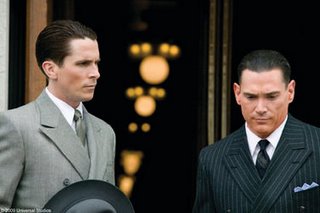 If the material covering John Dillinger is flawed but generally engaging, then the side plot covering the formation of the FBI to track him and other gangsters down does not work quite as well. We see J. Edgar Hoover (Billy Crudup) and his obsession with capturing or killing Dillinger, but the movie pretty much stops there. He comes and goes from the movie, never really leaving much of an impression, except for Crudup's performance, which allows the actor to disappear into the character.. The one working for Hoover that is supposed to make an impression, Melvin Purvis (Christian Bale), never does. Bale portrays him as a single-minded man, and often comes across as a stereotype of the grim, stone-faced lawman who thinks of nothing but catching the criminal. The character and the performance come across as being one-dimensional, and just makes us want to see Depp come up on the screen again. Every time the movie switches over the side of the law, the movie's energy level seems to dip. There is a scene where Purvis rescues Billie, who is being beaten by another agent as he interrogates her for information on Dillinger. Since we learn nothing about Purvis other than his obsession to kill Dillinger, the scene and his actions don't quite hit the dramatic note that the movie intends.
If the material covering John Dillinger is flawed but generally engaging, then the side plot covering the formation of the FBI to track him and other gangsters down does not work quite as well. We see J. Edgar Hoover (Billy Crudup) and his obsession with capturing or killing Dillinger, but the movie pretty much stops there. He comes and goes from the movie, never really leaving much of an impression, except for Crudup's performance, which allows the actor to disappear into the character.. The one working for Hoover that is supposed to make an impression, Melvin Purvis (Christian Bale), never does. Bale portrays him as a single-minded man, and often comes across as a stereotype of the grim, stone-faced lawman who thinks of nothing but catching the criminal. The character and the performance come across as being one-dimensional, and just makes us want to see Depp come up on the screen again. Every time the movie switches over the side of the law, the movie's energy level seems to dip. There is a scene where Purvis rescues Billie, who is being beaten by another agent as he interrogates her for information on Dillinger. Since we learn nothing about Purvis other than his obsession to kill Dillinger, the scene and his actions don't quite hit the dramatic note that the movie intends.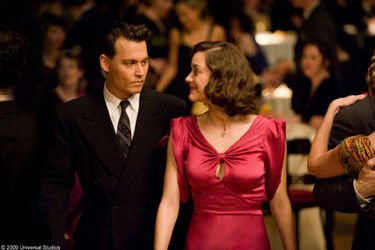 And yet, for all of its flaws and shortcomings, I still admire and am still recommending the movie. This may not be the movie I thought it would be or delve as deep into the characters as I thought it should have, but it's not without its great individual moments. One such moment is when Dillinger and some other prisoners escape from jail, steal a car, and find themselves stalled at a stop light, with law enforcement officials right on the sidewalk next to them. They don't want to draw attention to themselves, so they must make the agonizing wait for the light to change, and hope they're not noticed. It's a throwaway moment, but a very tense and wonderful one. As I also mentioned, Depp and Marion Cotillard get some wonderful moments together. We can sense the sexual and personal attraction between them during their scenes.
And yet, for all of its flaws and shortcomings, I still admire and am still recommending the movie. This may not be the movie I thought it would be or delve as deep into the characters as I thought it should have, but it's not without its great individual moments. One such moment is when Dillinger and some other prisoners escape from jail, steal a car, and find themselves stalled at a stop light, with law enforcement officials right on the sidewalk next to them. They don't want to draw attention to themselves, so they must make the agonizing wait for the light to change, and hope they're not noticed. It's a throwaway moment, but a very tense and wonderful one. As I also mentioned, Depp and Marion Cotillard get some wonderful moments together. We can sense the sexual and personal attraction between them during their scenes.
See the movie times in your area or buy the DVD at Amazon.com!






0 Comments:
Post a Comment
<< Home